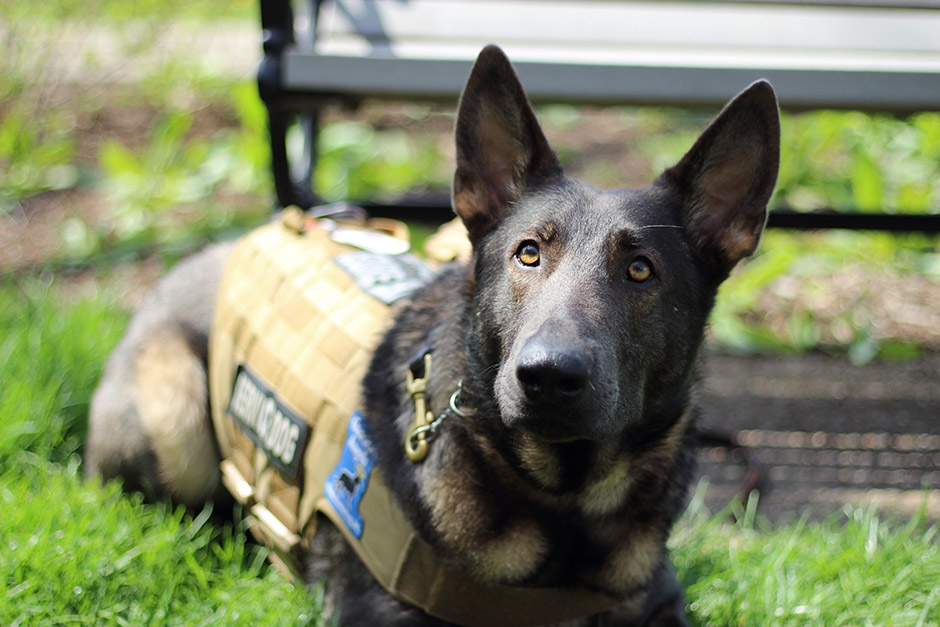

By Seth Culp-Ressler | Features Editor
The early weeks of 2015 were still caught in the throes of winter as Connor Green waited in line at the South Hills GetGo, sandwich in hand. It had been a long day at work — Green was plowing snow at the time — and he was ready to relax for the evening.
That’s when the world went dark.
“There was a dude behind me, and my knees locked up, and I just fell into him, took him out,” he recalled. “The cop [further back in line] thought I was playing a prank. He looked down, and my eyes were rolled into the back of my head, and I stopped breathing.”
It had been three months since Green’s discharge from the Army.
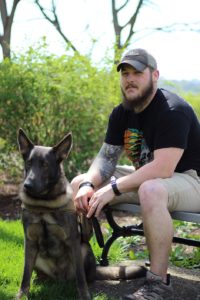
Green was paired with Bradley in October last year.
Duquesne University’s veteran population makes up around two percent of the overall student body, according to Don Accamando, the director of Duquesne’s Office of Military and Veteran Students. Green, now 24, is one of them. The end of this semester will mark three semesters of his enrollment on the Bluff as a secondary education major. He hopes to one day teach high school history.
Back in the South Hills, Green would soon awake in an ambulance, confused and alone. He was experiencing the aftershock of a severe seizure. His body ached all over. His balance was off. His memory wouldn’t cooperate. His driver’s license would soon face a six month suspension.
“[Seizures] really kick your ass mentally and physically,” he explained. “After you come to, it feels like you just ran a marathon.”
That time wouldn’t be the last. Doctors determined that Green wasn’t epileptic — the most common cause for seizures — but were unable to offer any further explanation for his newfound condition. Just over 1 ½ years later, in September 2016, his second episode hit while in the ice cream aisle at Trader Joe’s, ambulance and all.
At that point, Green knew he needed help.
* * *
Enter Bradley, a gregarious German shepherd who now shadows Green everywhere he goes. Bradley is a certified service dog with a unique and, for Green, extremely important skill: the ability to sense seizures before they happen. As Green explained, though, Bradley’s companionship goes well beyond that specific talent.
“I don’t have to worry about going down [from a seizure] and coming back and not knowing anybody who’s there,” he said. “Because every time I come back from a seizure I’ll be fighting the people in the ambulance because I’m strapped down, I don’t know [what’s] going on.”
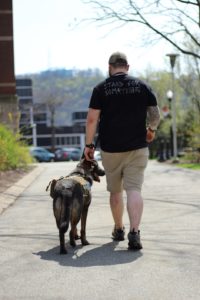
Bradley follows Green wherever he goes, every single day.
Following his second seizure, the idea of getting a service dog wasn’t anywhere on Green’s radar. At least, not until he got an email blast later that September from Accamando.
It was an invitation to a fundraiser for Life Changing Service Dogs for Veterans, a nonprofit for which Accamando is a committee member. The organization works to provide service dogs to vets in Western Pennsylvania. The email also mentioned that Duquesne, in conjunction with the organization, had successfully raised the $22,000 it costs to provide a dog for a student in need.
“I remember just looking at [the email] for days, and just really just reflecting on, you know, is this the right thing, is this what’s best,” Green said.
For all the benefits they bring, service dogs are also a full-time responsibility for their owners. Everywhere the handler goes, the dog goes. Every day, every night. Green had entertained the idea of getting a dog purely as a pet after he returned from his service, but decided he wouldn’t be home enough to provide the needed attention. This new opportunity, however, seemed to be a solution for all of his hangups at once. So, he sent Accamando a message.
“I have the ability to see [student’s class] schedules,” Accamando recalled. “So I said, ‘I see you have a break between class A and B. Stop down, I’m in Liebermann on the seventh floor.’ And, pow, he was here.”
From that first meeting in early October the process of applications and paperwork moved with impressive speed. By the end of the month Green was flying down to the organization’s partner group — Guardian Angels Medical Service Dogs — in Williston, Florida, to meet his new canine partner. Ten days of intensive training later, Green found himself headed back to Pittsburgh, with Bradley snoozing under his airplane seat.
* * *
Spend any amount of time with Green and Bradley and their intense affection for each other is impossible to miss. In many ways, Green embodies the stereotypical visual of a military vet — a muscular, tattooed, tobacco-chewing guy — but Bradley never fails to bring out the kid in him. Generous pats, head scratches and “who’sagoodboy”s abound.
Accamando saw that love for and from Bradley foster other traits in Green as well.
“It’s safe to say, I think, that he did a 180, a hundred and eighty degrees out from who sat in that chair [in late September] — humble and quiet — to this ‘get out of my way’ [sense of confidence],” Accamando said.
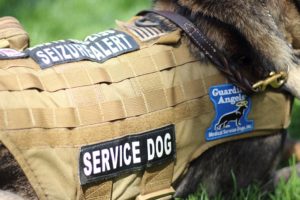
Bradley has the ability to detect seizures before they happen.
Green is a storyteller, a fitting trait for somebody aiming to teach history. Of late, Bradley is often the main protagonist in his tales. There was the time Green, while waiting at a bus stop, gave an impromptu lesson about service animal etiquette to children passing by with their mother. Or the time when he caught Bradley taking a taste of his housemate’s unattended beer. Even the simple stories, like Bradley’s behavior upon arriving home every day, make Green instantly light up.
“Sometimes when we get home I’ll take off his vest, because once the vest comes off he can unwind, so to say,” Green said with a smile. “And then he’ll just do laps around the house … just because he’s so excited. He’s a pup through and through.”
When that vest is on, though, Bradley is the consummate professional his strict training prepared him to be. So far, Green said, Duquesne’s campus community has been respectful of that fact, never bothering Bradley without permission. That said, he admitted to being pretty lenient, usually letting anybody who asks politely to give Bradley a good pet.
Bradley’s most important day at work since last October didn’t happen on the Bluff, however. Instead, it came while Green was sitting on the couch at home one evening. He’s gotten better at detecting the precursors to a seizure, and knew one was about to hit once the tunnel vision and euphoria started.
Immediately Bradley was on his lap to alert him. Since they were at home, Bradley wasn’t wearing his vest and medication pouch. Normally Green would be able to simply reach in and get his pills off of Bradley’s back. Fortunately — though unable to verbalize much of anything — Green was able to motion to his housemate, who was also in the room, that he needed meds pronto.
Within a minute of taking them, Green snapped back to normalcy. His roommate was shaken, but Green was glad to just laugh and brush it off. It was a proof of concept, and Bradley passed the test with flying colors.
“What he does, is, you just can’t put a price on it,” Green said. “He’s unbelievable.”




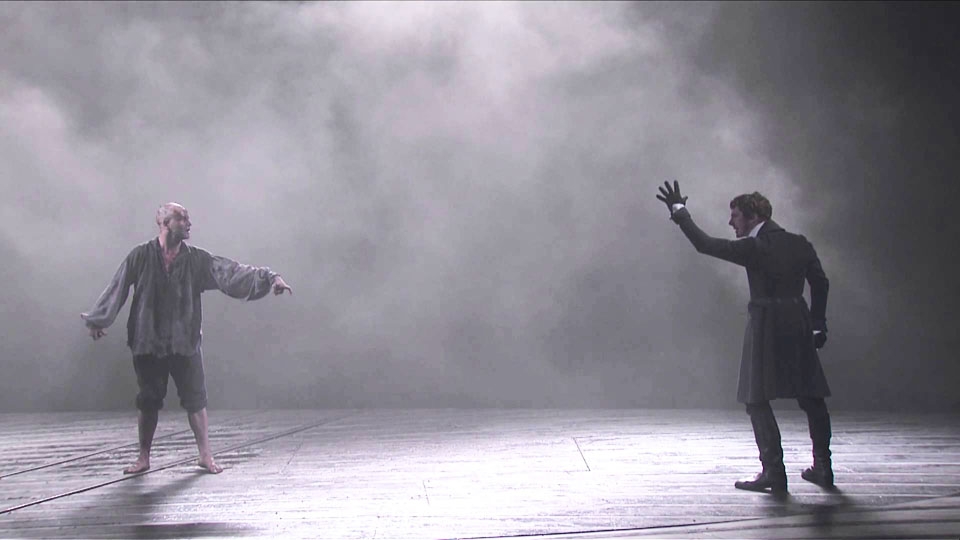
I am glad to hear about other people and their service dogs. My dog has saved me many times. He alerts me to high or low blood sugar. He refused to go to my car one time until I ate to bring my sugar up. Stability is one of my problems. I use him a lot to get out of bed, a chair and going up and down stairs. I’m a fall risk even with a caine or a walker but not with my wonderful service dog.